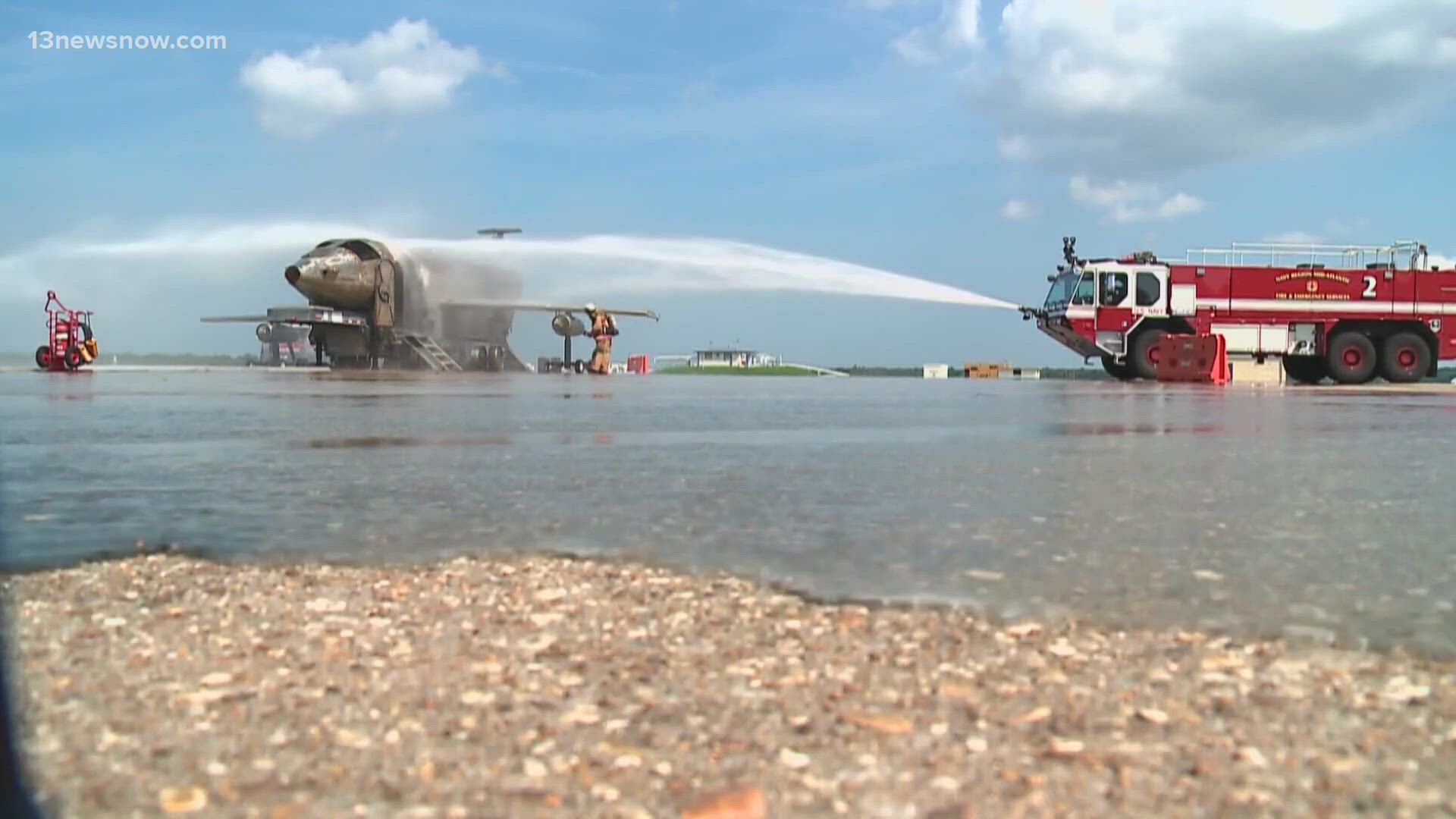VIRGINIA BEACH, Va. — Thousands of drinking water samples near more than 60 military bases showed unsafe levels of "forever chemicals" — including Naval Air Station Oceana in Virginia Beach.
The non-profit Environmental Working Group (EWG) analyzed Department of Defense data and found that military bases across the country are contaminating private drinking water wells with PFAS.
The group found 13 private wells near Naval Air Station Oceana with levels the EPA now deems unsafe, but it's not high enough to trigger Department of Defense support.
PFAS, or Per- and poly-fluoroalkyl substances, are chemicals used in hundreds of everyday products, including non-stick pans, some cosmetics and water-resistant clothing.
Firefighter says 'forever chemicals' have affected his health: 'This stuff is nasty'
For people like retired Air Force Firefighter Kevin Ferrara, the substances hid in firefighting foams on military bases.
"This stuff is nasty," Ferrara said. "We were literally slathered in it as we did our fire training."
Because those chemicals are extremely difficult to break down, the level in your blood can build up.
Ferrara said because of that, he’s now dealing with Type 2 diabetes, high cholesterol, sleep apnea and nerve damage. Some of his colleagues are diagnosed with cancer.
"PFAS exposure… we didn’t expect that," he said. "I think we’re only scratching the surface of what impacts it has on the human body."
Now, the EWG said contamination from military bases has seeped into the drinking water of nearby neighborhoods.
"That contamination finds the path of least resistance and ends up in our local communities," Ferrara said.
Jared Hayes with EWG said looking through Department of Defense data, they found 63 military bases showed "unsafe" levels of forever chemicals in thousands of drinking water samples near the bases, including Naval Air Station Oceana.
"Once they get into the water, they can spread out from the bases to surrounding areas and they can get into these drinking water wells," Hayes said. "From there, seeped into the soil and groundwater contaminating more than 450 sites that we know of so far across the country."
He said the groundwater at Dam Neck Naval Base revealed high levels of PFAS, as well.
"The Dam Neck Naval base in your area back in 2022, revealed that there were 18 different types of PFAS compounds found in the groundwater on base," Hayes said. "Just one type of PFOS, one of the most well-known PFAS chemicals, was found at over 30,000 ppt in the groundwater."
Defense Dept. adheres to PFAS standards advocates say are outdated, dangerous
Previously, the Environmental Protection Agency (EPA) has said anything above 70 parts per trillion is a dangerous level, but Hayes said it's "an outdated EPA health advisory standard that was first developed in 2016."
Now, the EPA has proposed federal limits that would limit toxic PFAS chemicals to the lowest level that tests can detect: 4 parts per trillion. They say it's a move that will save thousands of lives and prevent serious illnesses, including cancer.
The Department of Defense (DOD) is still operating under the guidelines of 70 parts per trillion. Any number above 70 found in a private well will trigger the agency to provide bottled water.
"The DOD is waiting until the regulatory limit is set and made into law, but in the meantime, people are drinking water that is considered to be unsafe," said Hayes.
According to Ferrara, his doctors say all of that exposure has caused a high level of PFAS in his blood.
"To date, I have 22.8 nanograms per milliliter of PFAS in my blood. It doesn't sound like a lot until you convert it to parts per trillion. Then it becomes 28,800 parts per trillion. You compare that to the EPA's new lifetime health advisory in drinking water of only 4 parts per trillion, that's a huge difference," he said.
Because of that risk of exposure, the Centers for Disease Control (CDC) is now recommending doctors have a discussion with patients to see what their exposure might be and if blood testing would be beneficial.
"Once they're in the body, they don't break down," said Hayes.
What are our military bases in Hampton Roads doing in the meantime?
In early February, leaders from Norfolk Naval Shipyard encouraged people living nearby to let them test their private well water.
"We’ve sampled on base here, we just haven’t sampled off base. So in this local area, this is the first time we’ve gone to the public to ask to sample the private drinking water wells around the base," said Jim Mosman, the Commanding Officer of Norfolk Naval Shipyard.
In a statement from the DoD, a spokesperson says the department is committed to addressing PFAS releases.
"DoD supports EPA working toward regulatory standards for PFAS that help ensure a consistent approach that applies to everyone. In anticipation of the final standard that EPA expects to publish in the next few months, the Department is assessing what actions DoD can take to be prepared to incorporate EPA’s final regulatory standard into our current cleanup process, such as reviewing our existing data and conducting additional sampling where necessary. The Department is expanding ongoing investigations to determine where PFAS has migrated off-base above the proposed levels and working to determine when public or private wells may have been impacted," said a spokesperson in a statement.
"It’s the Navy’s top priority right now to ensure that we are mitigating any exposures in our surrounding communities," said Cecilia Landin, with the Naval Facilities Command Mid-Atlantic Environmental Restoration Program.
But Hayes said cleanup of the chemicals needs to happen now.
"It’s going to cost $8 billion to clean this contamination up," he said. "Frankly, the longer we take to clean it up, the more expensive it’s going to be and the harder it’s going to be."

